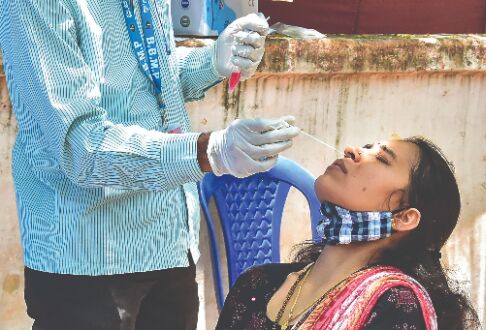Covid: '1.8% of India's population affected, 98% still vulnerable'

New Delhi: Less than 2 per cent of the total population in India has been affected by COVID-19 so far and 98 per cent of the population is still susceptible or vulnerable to the infection, the government said on Tuesday.
Lav Agarwal, the joint secretary at the Health Ministry, said 1.8 per cent of the total population in India has been affected by COVID so far.
"Despite the high number of cases reported so far, we have been able to contain the spread to under 2 per cent of the population due to continued efforts by the medical fraternity, states and districts," he said.
"This should also make us wary of protecting the still vulnerable/susceptible 98 per cent population. We cannot let our guards down, hence continued focus on containment is critical," Agarwal said.
Giving figures from around the world, he said 10.1 per cent of the population in the US has been infected so far, 7.3 per cent in Brazil, 9 per cent in France and 7.4 per cent in Italy.
However, NITI Aayog member (Health) V K Paul said that India's reproduction value (R) for COVID-19, which shows how fast the infection is spreading, is below one now which means that the pandemic is shrinking.
Addressing media, Paul said in many states the pandemic curve is stabilising.
"Comprehensive efforts at containment and testing are resulting in stabilisation. We still have a few states which continue to be cause of concern... there is a mixed picture but overall there is stabilisation and what we know from scientific analysis is the reproduction number is below 1 now which means the pandemic is shrinking," Paul said.
He said this has happened because there is a huge containment effort in addition to managing the cases in home settings and hospitals.
"We are hoping and keeping the case fatality rate reasonably under control. We have to be very mindful that when we are achieving declining positivity rate it is because of the results of what we are doing and that doing cannot be slackened. We cannot again let this go out of hand," he said .
Meanwhile, India's COVID-19 death toll climbed to 2,78,719 with a record 4,329 fresh fatalities, while the single day rise in Coronavirus cases stood at 2.63 lakh, the lowest in 28 days. The country reported 2,63,533 new cases in a span of 24 hours, taking the total tally of COVID-19 cases to 2,52,28,996 out of which 2,15,96,512 have recuperated from the disease. A total of 2,59,170 cases were reported in a span of 24 hours on April 20.
The active cases further reduced to 33,53,765 comprising 13.29 per cent of the total infections, while the national COVID-19 recovery rate has improved to 85.60 per cent, and the case fatality rate stands at 1.10 per cent.
About black fungus, Paul said till now the number is not that high but it cannot be taken for granted.
"We have held discussions with all states on black fungus and there is a push on availability of Amphotericin B and till now the number is not that high but we cannot take it for granted. There are a large number of cases through which we have learnt that when a combination of diabetes, an uncontrolled one, particularly in COVID and steroid use comes up then likelihood of this disease becomes a possibility. So whoever has diabetes should try to keep it in control," he said.
He stressed on rational use of medication. "We reiterate that proper use of steroids has to be done and we must not take it lightly," he said.
On COVID infection in children, Paul said it was seen that children were affected and they are asymptomatic.
"So response remains the same of what we do, we have to protect ourselves with COVID appropriate behaviour and they have to be encouraged to wear masks and main social distancing. There is a clear cut science-driven protocol already available. If COVID symptoms are seen in children then that should be followed. Severe disease in children is uncommon but we have a protocol for that too," he said.
He said COVAXIN is going to conduct a trial and it will begin in 10-12 days.
"Science's attention is on it and children can have asymptomatic infection and they can also spread it. We have reasonable clarity on it," he added.



